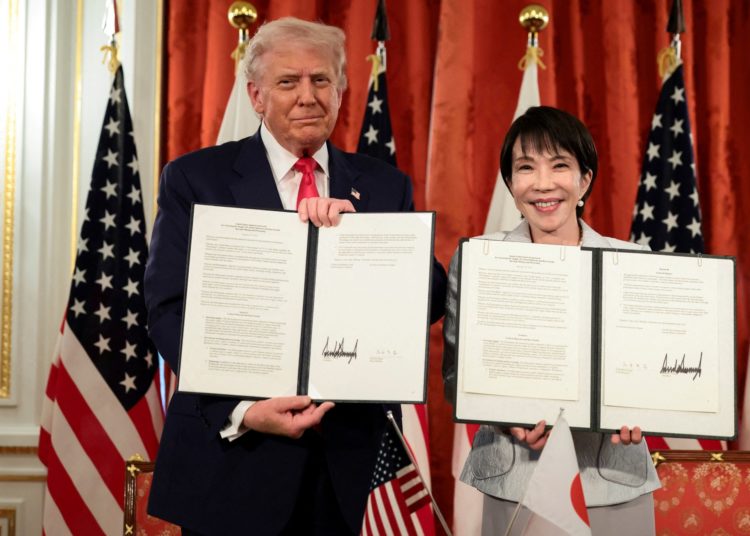Is Britain becoming like Italy? Or Belgium? The comparison might be unfair to those two nations. Since Brexit, the United Kingdom has become a leader in Europe in terms of panic-laden and short-lived governments.
The election of Keir Starmer in July 2024 was supposed to change that. A grown-up administrator as the U.K.’s prime minister, with a huge parliamentary majority, promised a return to stability and growth. Now, London is gripped by talk of Starmer being ousted, which will most likely occur after next May’s local and regional elections, where his Labour Party could receive a drubbing.
There is little disagreement privately within Starmer’s ranks and publicly outside of them that his tenure has been a spectacular disappointment so far. The only two questions are why it has come to that and whether he can do anything to turn the situation around.
At the start of September, fresh from the summer break (though, for a second year in a row, he has taken precious little time off), Starmer announced “phase two” of his government. It sounded good, except he didn’t outline what the refresh might entail. I was told that the term was suggested to him by one of Tony Blair’s veteran aides at a social event, who was surprised to see it adopted the following day.
Over the next couple weeks, two disasters struck that could be attributed to a mix of bad luck, individual indiscretions, poor judgement, and the lack of a more sustained narrative that could have helped offset the negative narrative.
First came the demise of Starmer’s deputy prime minister, Angela Rayner, a woman of genuine working-class origins who had made her way into politics through grit and charisma. After incessant probing by right-wing newspapers, which aimed to bring down someone as potentially popular as her, Rayner was found to have underpaid taxes on a property she bought. Starmer backed her, until belatedly he sacked her.
Then came the Shakespearean downfall of the “prince of darkness,” Peter Mandelson, after around seven months as the British ambassador to the United States. (Mandelson loves titles and the Edwin Lutyens-designed mansion on Massachusetts Avenue, on Washington’s Embassy Row). Starmer had wanted a signature appointment for the devilishly complicated task of managing relations with U.S. President Donald Trump. He was persuaded to turn to Mandelson—an arch-fixer, three-time, two-time cabinet minister, and one-time European commissioner, who he didn’t know personally very well.
Everyone in politics knows, or knows of, Mandelson. I’ve had dealings with him since he was Blair’s chief strategist and spin doctor in the mid-1990s and witnessed firsthand his strategic nous, his steely determination, his almost poetic put-downs of those he considered a problem or irrelevant (or not rich enough), and his vanity. Given the company that he keeps, it would have been a surprise if he had not been a close friend of Jeffrey Epstein.
Starmer backed Mandelson and then later sacked him, making it the third time that he has been removed from a top job because of a scandal. The difference in this recent case was that the prime minister asked a senior foreign office official to do it on his behalf. Now, Starmer must contend with Trump’s state visit to the U.K. without an envoy.
Mandelson has insisted that he told his interview panel about the extent of his links with Epstein, but Downing Street’s inner circle denied this and said he was economical with the truth. Once Trump’s trip is over, will a smarting former envoy wreak some form of revenge? He might not need to—others inside the Labour Party are lining up to denounce Starmer.
It is worth remembering the lay of the land 14 months ago. The July 2024 general election gave Labour a staggering 174-seat majority. That was the third-best showing in the party’s history and its best since Blair at the turn of the century.
To be fair, the backdrop was not as propitious as 1997. The advent of Blair—after 18 years of conservative rule—had Brits celebrating on the streets. It sends shivers down one’s spine to revisit those moments. The closest equivalent would be the election of Barack Obama as U.S. president in 2008.
Starmer’s victory came against a much darker international and domestic backdrop. The number of seats that Labour won, thanks to Britain’s quirky electoral system, didn’t reflect its actual share of the vote, which, at 33 percent, was up only marginally from the previous election, when it lost.
Nevertheless, a win is a win, and the new prime minister had complete control of Parliament. Like-minded leaders around Europe, forced to cobble together fragile coalitions, looked on enviously.
There was one big problem, however. A lawyer by training and a public prosecutor for most of his career, Starmer came into politics very late. His strengths are clear—he is good at marshalling arguments, and he is organized. His early successes were impressive—taking over a political party still in the grips of the left, consolidating his leadership, and kicking out the conservatives after a chaotic 14 years.
The trouble was that, once in office, Starmer didn’t appear to know what he wanted to do with his newfound power. His conduct of foreign policy has been his notable achievement, which includes his staunch support for Ukraine and the rallying of a coalition of the willing, alongside his assiduously constructive if fawning relationship with Trump.
Back home, Starmer’s weaknesses have become even more glaring. Having risen to power with few political confidants, he has tended to home in on individuals who impress him with their last remarks; plus, he has fallen back on some of Blair’s old team. They were good for their time, but several advisors have already been forced out from Starmer’s circle.
One of them is still there—his chief aide Morgan McSweeney, who is now blamed for pretty much everything that’s gone wrong, including the Mandelson appointment.
As Labour is gripped by fear of Nigel Farage, his Reform Party, and even more right-wing forces—such as those backed by Elon Musk, who recently told a London rally of more than 100,000 people in a video address to use violence—the government sings to their tune with increasing desperation.
It was McSweeney who urged Starner to push through welfare cuts, in the teeth of opposition from Labour members of Parliament, and embedded a tougher line on immigration. It was McSweeney who also forced through a merry-go-round cabinet reshuffle earlier this month, swapping around foreign, interior, and justice ministers just as they had got to grips with their briefs.
Far from promising a fresh start, Starmer’s entourage have been just as active in briefing against each other, taking freebies where they can, and showing extraordinary lack of emotional intelligence, such as a homelessness minister kicking out tenants to increase rent in her private property.
With his tendency to look over his shoulder, rather than lead from the front, Starmer’s new eminence grise is the mayor of Manchester, England’s “northern powerhouse” city. Andy Burnham, who was a minister under Blair but was not a Blairite, is being portrayed as the man-in-waiting. Burnham would portray himself as the candidate of the “soft-left,” with more emphasis on welfare and on workers’ rights, alongside a possible wealth tax. Yet his supporters point out that, as a former minister under Blair and his successor, Gordon Brown, he is part of Labour mainstream tradition.
Success for him, however, will not be straightforward. First, Burnham must regain a seat in Parliament, and Farage has promised that Reform will throw every resource possible to humiliate him. Then, he must win the Labour leadership. The more dangerous that Burnham becomes to Reform and the conservatives, the more the generally right-wing British mainstream media will attack him.
Given the propensity for crisis in the U.K. on a weekly or monthly basis, anything can happen, and predictions have a habit of being wrong. It is not inconceivable that Starmer manages to turn around and produce language that resonates, including a more coherent and inclusive set of economic and social policies. The clock, however, is ticking.
By next May, Britain could have its sixth prime minister in a decade. And, in case you were wondering, Italy is on its fifth and Belgium is on its fourth.
The post Starmer Is the Dog Who Caught the Car appeared first on Foreign Policy.




